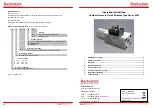Summary of Contents for V1910
Page 1: ...1 HP V1910 Switch Series User Guide 5998 2238 Part number 5998 2238 Document version 2 ...
Page 85: ...73 c Display the rate settings of ports ...
Page 102: ...90 a Port traffic statistics ...
Page 252: ...240 b The Port Setup tab ...
Page 260: ...248 d The Port Setup tab ...
Page 362: ...350 a Ping operation summary ...
Page 421: ...409 c Configure authorized IP ...
Page 479: ...467 Index A B C D E F G H I L M O P Q R S T V W ...



































